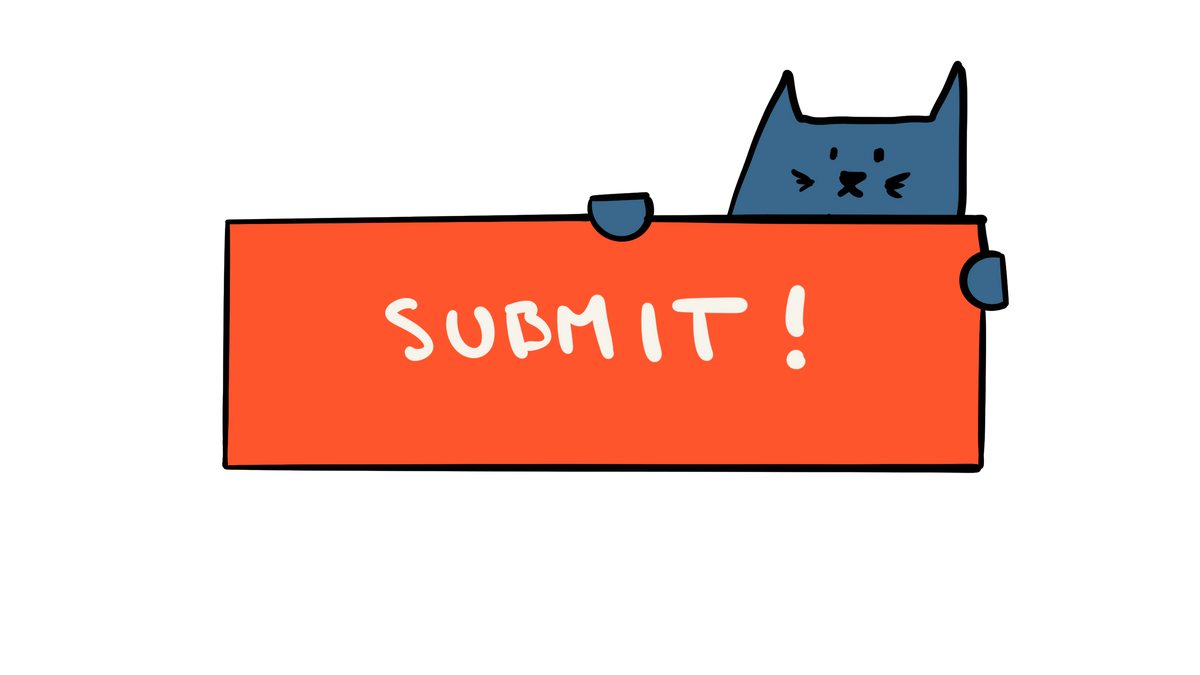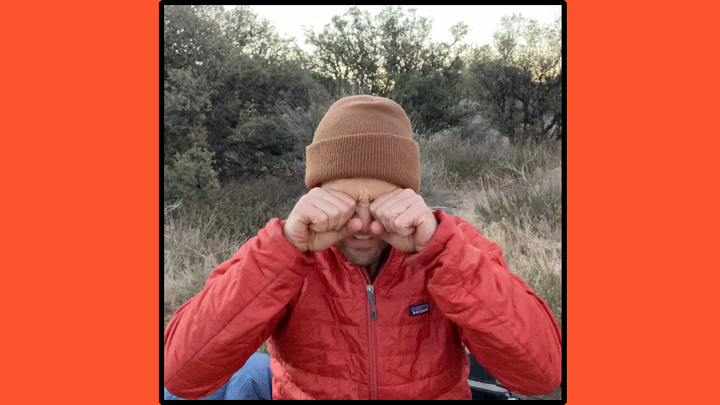The Submit Button Method to Learn Skills Fast (Not Just Information Recall)
Why coming up with your personal Submit Button in your learning journey is a great way to optimize skill acquisition.

I want to know a lot of things. I want to be good at a lot of things. If I took a minutes to write down all of those things, it would look like this:
- Running
- Playing Guitar
- Singing
- Writing
- Coding
- Drawing
- Biology
- Mythology
- Biking
- Climbing
- Navy Officer Things
- Filmography
That was easy. I'm pretty sure anybody doesn't have issues coming up with a list of things they want to be good at. The issues comes in actually getting good at those things now. As an exercise, I like to categorize my list.
I see two ways to categorize this list. The first way feels like the classical way to establish categories. It would look like this.
- Fitness
- Music
- Computers
- Science
- Career
Another way would be even broader.
- Skills
- Facts
This somehow feels more manageable. To get better at those things I listed earlier, I need to optimize how I learn and maintain skills and my ability to recall facts.
There is one problem though. As I combed through some of the research, there is plenty of advice on how to get better at information recall, but not a lot on skill acquisition. 10 out of 12, or 83%, of items in my list of things I want to get good at are skills, not facts. I imagine most people's lists are like this too. I believe the research is skewed towards information recall as it's easier to objectively measure and fits well within the context of academia, professors studying students' performance. It's just not useful.
Some of the wisdom behind optimized fact recollection translates well to skill acquisition, but there are a few additional tools we can utilize to increase our skills.
[Spaced] Repetition is the Mother of Learning - Thanks Admiral Rickover and Coach McG
It's no secret that practice is the key ingredient when learning anything. If you want to get good at something, you need to do it a lot. We don't always do that efficiently.
I've been through some extreme "learning by repetition" periods in my life. The most prominent of these came from Navy Nuclear Power School, where I spent 2 hours from 0500 to 0700 every morning for 6 months simply filling blank pages of computer paper with rewritten notes and example problems. I relied heavily on mnemonics in this learning style and route memorization as the weekly tests were cumulative and more than 80% of the problems simply required regurgitation rather than information synthesis. It was extremely effective despite how boring it was. I think the novelty of being a brand new Naval Officer and the fact that learning this material was MY JOB helped me to overcome the attention deficits that would usually plague this style of learning. I still remember pieces of a very elaborate mnemonic I had to recall pressurizer water level shrink and swell due to power transients. The mnemonic utilized a story I made up, of all things, about the stock market. It worked because there was a lot of up/down going on.
Another story that comes to mind is where I learned the quoted cited in the heading, "Repetition is the mother of learning." I was a young 7th grader, on the basketball court for after-school practice, with a 6 foot 7 behemoth of a coach barreling towards me. "I'm going to come at you now" he bellowed. We were learning how to take a charge. It was effective albeit concerning. Get run over or take the charge. It was simple. Most of us got run over, but we were learning. "REPETITION OS THE MOTHER OF LEARNING!" coach yelled. We were lined up single file to get run over, and then do it again. I imagine the trauma of having a the hulk run me down over and over is what really cemented that quote in my head. If I recall correctly, we forced offensive fouls for charging almost every game since that day.
Is there some way in repeating a task that we can learn more efficiently though?
What The Research Says
OK, so most of us don't want to rewrite notes for 2 hours first thing out of bed or get bombarded by beasts as while we pluck chords or draw cats.

A 2006 meta-analysis from the American Psychological Association [1], and just about any research on learning and fact recollection, points to the importance of Spaced Repetition. This is not new. Really all it is saying is that it's better to practice something spaced out over time than it is to cram. In general, practicing something for 6 hours over 6 days is better than practicing something for 6 hours in 1 day. Makes sense.
One interesting conclusion this paper makes is that "the interstudy interval producing maximal retention increased as retention interval increased." What this is saying is that if you need to recall something in 1 week from now versus 1 year from now, the amount of time you spend in between study sessions should increase. The magic number lies somewhere between 10 and 20 percent. For example, if your test is in 30 days, you make your interstudy interval 10% of that, or 3 days between study sessions, to maximize your retention.
In academia, the interstudy interval is easy to determine because the time to examination is already determined by your syllabus. In real life, when we decide that we want to be a guitarist or artist, we the final examination is difficult to determine. What is the final examination for somebody who is picking up a Sony mirrorless camera for the first time and thinks I want to take beautiful photos?
Deliberate Practice
Three books come to mind when I think about deliberate practice. Talent is Overrated (2008) Geoff Colvin, Outliers (2008) Malcom Gladwell, and Peak (2016) Anders Ericsson. You may have heard of the "10,000 hour rule", which is actaully a topic of debate among these authors, but the best one-liner of dileberate practice I've come across is that we practice something that would take 1 to 3 practice sessions to master.
Self Testing
This is the secret sauce. So far we've learned that learning should take place over q period of tie with regular intervals, and that we should chunk our learning into manageable challenges. Finally though, you must design your own testing syllabus. Sometimes, it's an easy task, but often it is not.
Let's revisit my list from earlier. I think that running lends itself to simple self testing. Sign up for a race! A race is a wonderful way to measure your running improvement. Not only do you have external competition. If you ain't first you last. You also have personal benchmarks. Were you faster at running a half marathon after 16 weeks of training or not? You get a fantastic measure against yourself and others. Enter a few races and you now know if you are a good runner or not. Confounding variables exist: temperature, elevation, your general condition that day, but keep doing these and over time your dataset will grow and smooth.
Now let's try something a bit more difficult like playing guitar and singing. There is a ton of great learning material out there but none of it requires you to actually perform. I spent years plucking around on YouTube and through a few online courses, but it wasn't until I chose pieces to perform that I really noticed improvement. My self test went like this: I want to record a video of myself performing Rocketman by Elton John. For this one I set a deadline, and even though it was far from perfect, I had tested myself.
Feedback
Would the performance hold up? I sent it to some friends and family and I got some nice compliments. If you don't want to share it, that's OK too, there is a ton of value in watching and listening to yourself perform, especially when you are just starting. Is it something you would share with your friend who loves that song if you stumbled upon it randomly? If not, you need to practice more.
The key is that you scheduled a self-test, which now gives you the ability to plan your learning, and the ability to receive feedback or compare yourself to a similar case.
Pressing the Submit Button
I believe that having a strict deadline or performance requirement is an invaluable tool which forces us into deliberate practice.
For me, Pressing the Submit Button is what I think about when I turn in that test, publish a performance video to YouTube, or submit an app to the app store. I have completed this work and am moving on to the next item. The goal in my learning process is to get into a cycle where I press the submit button on a regular schedule. That could be daily (a new drawing), weekly (a new song), or monthly (a new app).

When thinking about learning new skills, it so important to frame your time horizon correctly. Pretty much any skill that you might want to master has a time horizon measured in years, but we need ways to make that more digestible. Coming up with what's required to hit a (real or hypothetical) Submit Button is what will carry us through that long journey towards mastery.
I think I'll hit that button now.
🍻 Keegan
- Cepeda, N. J., Pashler, H., Vul, E., Wixted, J. T., & Rohrer, D. (2006). Distributed practice in verbal recall tasks: A review and quantitative synthesis. Psychological Bulletin, 132(3), 354–380. doi:10.1037/0033-2909.132.3.354



